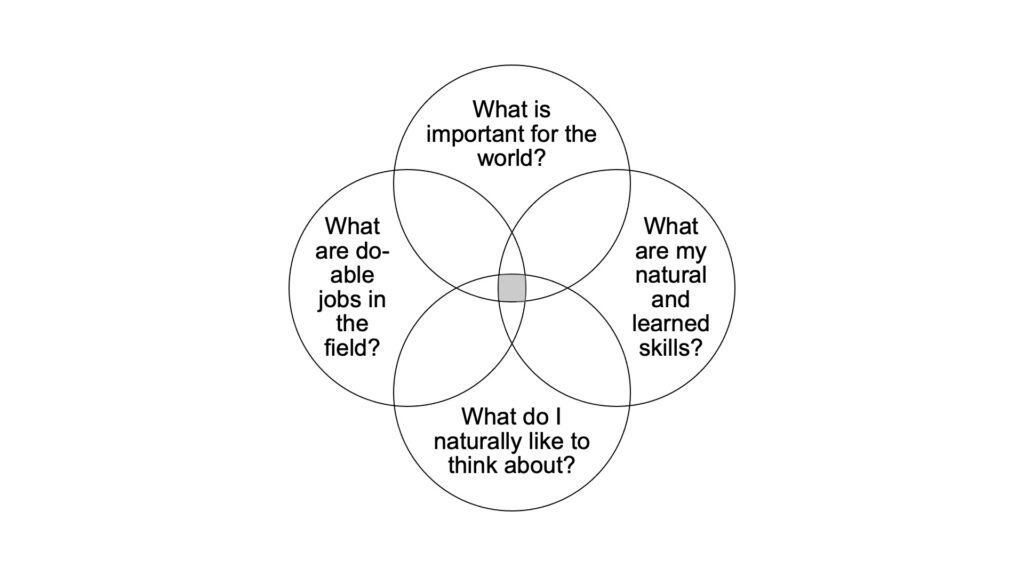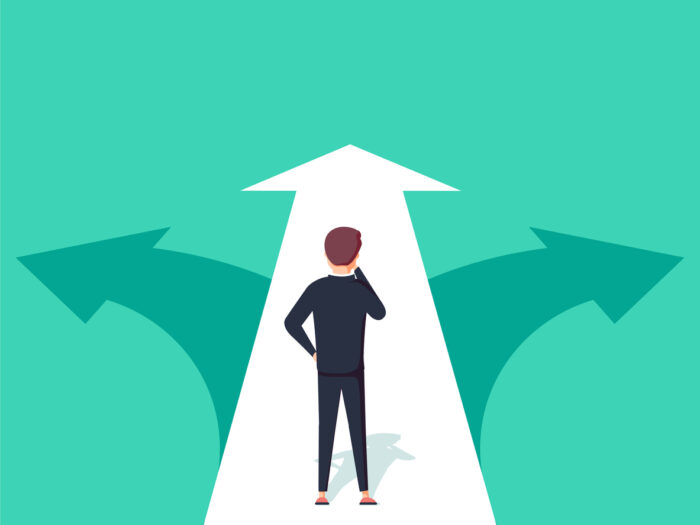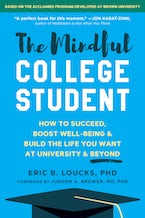By Eric B. Loucks, PhD, author of The Mindful College Student
During the great resignation when millions of people have left their jobs in search of something better, many of us are taking a step back and reconsidering our careers. Also, many young adults are at an inflection point where they are completing at least one phase of training (e.g., high school, college, university, technical degrees) and launching into a world that is in flux of how and why people work.
As a professor at Brown University, who specializes in training young adults both for their careers and in mindfulness practices to improve their well-being and performance, I’ve found four questions to be particularly useful, not only for young adults, but for all adults serving their communities (Figure 1).
When I offer these questions to young adults, I invite them to look for the sweet spot career-wise that shares a similar answer for all four questions. There is a guided meditation on this later in the article.
What is important for the world?
What are your natural and learned skills?
What do you naturally like to think about?
What are doable jobs in the field?

People who have been both happy and successful in their career often broke free from societal expectations of them, parental expectations, and honestly, their own poorly informed expectations of themselves. They often came to know themselves better, came to know the world better, and found a match between who they naturally were and what they wanted to do for their career.
For example, as part of writing the book The Mindful College Student, I interviewed about two dozen young adults who had either gone through my mindfulness courses at Brown, or who had years of strong mindfulness practice themselves. One, named My Ngoc, shared that she was once about halfway through a ten-day meditation retreat and was experiencing a lot of leg pain from sitting cross-legged. She had recently applied to medical school for the second time, and it wasn’t going the way she hoped. Also, she wasn’t sure medicine was what she wanted to do with her life, despite it being a socially respected career. She was watching the leg pain, and with surprise, noticed the pain disappear. She realized in that moment that she didn’t need to hold on to the pain. In fact, in that moment, she realized that she was holding a lot of ideas of who she was and who she “needed” to be (such as a medical doctor), and a lot of insights arose out of that emotional and physical pain about what she could let go of and who she really was.
After the meditation, she shared, “It occurred to me that the experience translated on to the bigger picture of who I am. Who I thought I was isn’t who I am. I am more than that. From that deeper space, I was able to access the deeper truth about who I really am and what I really care about: helping, relationships, and people. That led me into social work that I have been very, very happy with. I realized I didn’t want to be in the biomedical model of operating. I care a lot about advocacy, social justice, and directly serving traumatized and marginalized populations, and I wanted to be seated in a field that puts that at its forefront.”
Thich Nhat Hanh (1991) teaches a practice for processing a strong emotion. He suggests caring for it like a parent would a crying child. Then, after the emotion is cared for in a compassionate, kind, gentle way, see if it’s possible to look deeply into the roots of that emotion. Once we understand the roots, such as My Ngoc did, a clearer path can open up, and that could be a career path or a path for improving our well-being.
Below is a meditation focused on your career path that you might like to try.
Career Path Meditation
The intention of this meditation is to first become grounded with an anchor point that is with you every moment of the day, such as the breath, a part of the body (such as the palms of the hands or soles of the feet), or sound. We use concentrating on that object of meditation to train ourselves to focus our attention where we choose to, including on this very moment that will never happen again. Once you have arrived in this moment and have connected with your body and mind (in other words, are fully present harnessing the messages from your physical sensations, emotions and thoughts, which are in many ways the entire human experience that tells you how and who you are), you can then answer a series of questions to identify your career sweet spot. The sweet spot addresses not only what is important for the world, but also the areas you like to naturally think about, that uses your natural and learned skills, and that has doable jobs in the field. This is the place where you can be well expressed, doing work that you are good at, enjoy, and the world needs.
Inviting you to get out something that you can write or type on, like a journal, scrap of paper, laptop, or smartphone. Putting that item down beside you and getting ready for a contemplation.
As you engage in this meditation, I encourage you to always respect your limits and if any contemplations are overwhelming, you are encouraged to let them go, such as by distracting to something healthy like a particular safe object of meditation (e.g., the breath or sound), or even taking a little walk or having a cup of tea. Please trust your wisdom more than the words in this contemplation. There are many paths to happiness and career success, and meditation is one for some of us, but likely not all of us.
Closing the eyes most of the way, if you are comfortable with that, except, of course, when you are reading the contemplations below.
Choosing an object of meditation to focus on that is with you every moment of the day, such as the breath, a part of the body (palms of the hands, soles of the feet), or sound. Spending some time with focused attention on that anchor point, noticing when the mind wanders, and with gentleness, bringing it back to that object of meditation.
Bringing awareness to physical sensations. What is being felt in the body in this moment? For example, are there elements of warmth, coolness, comfort, discomfort? What messages is the body sharing right now, and can you be open for them without judging them, just exploring them with self-kindness and curiosity, seeing if the sensations are steady or if they shift and change moment to moment.
Next, if you like, checking in with the heart, with the emotions. Perhaps noticing what emotional tone is here right now, as our emotions are important signals for us, giving us information about how and who we are right now. Even silently naming what emotions are present, and noticing if they shift and change, or are steady.
Then, if you like, shifting awareness to the mind, particularly the thoughts. Can you think of it like sitting on the bank of a river watching a twig on the surface of the river float by? Sometimes the twig gets caught in a current or whirlpool; other times it pauses. Can you just sit on the bank, and observe your thoughts with curiosity and kindness? What is here? Are the thoughts currently in a familiar place, or are they fresh and new?
Here we are connecting with the body, emotions, and thoughts, which is a great deal of the human experience—perhaps the entirety of the human experience. They give us important information, that we don’t necessarily need to act on unless it seems wise to do so.
Now that we have perhaps connected with ourselves, and had a moment to stop, calm, and rest, the next invitation is to connect in with figure 1. Inviting you to reflect on the questions:
What is important for the world at this time in history? What is needed?
Even listing your responses on what you have beside you to write on.
As you are ready, inviting you to reflect, connected with your body, heart, and mind:
What are my natural and learned skills?
Even writing these strength areas down, if you like.
Next, asking yourself: “What do I naturally like to think about?
When I am wandering down the road, or taking a shower, where does my mind go?”
If you can find a career path that taps into what you naturally like to think about, then suddenly your down time is productive for work.
Now shifting over to the self-reflection: What are doable jobs in the field?
These might be ones that have a good number of job openings right now, for example, or that have at least a decent salary. This is a reality-check question to make sure the career path you hope for is likely attainable for you.
Now, inviting you to look for the sweet spot where the circles in figure 1 overlap. What is important for the world AND you like to naturally think about AND utilizes your natural and learned skills AND has doable jobs in the field? Is anything arising for you in these areas? Are there any questions you might like to answer through your own research and talking with people in that field?
As you are ready, returning to your anchor point of the breath, body, or sound, taking a moment to get grounded before continuing on with your next steps of the day.
Everything changes with time, including what the world most needs, what our skills are, what we naturally like to think about, and what are doable jobs. What is this moment in time sharing with you, whether you are embarking on your career path as a young adult, or are mid-career/volunteering and ready to take a step back and reconnect with passion to address the greatest needs of our time, matched with who you truly are?
Eric B. Loucks, PhD, is associate professor of epidemiology, behavioral and social sciences and medicine at Brown University. He is director of the Mindfulness Center at Brown. He developed the Mindfulness-Based College program for young adults that has been shown in a randomized controlled trial to improve overall well-being, sleep quality, depressive symptoms, physical inactivity, and loneliness. His book, The Mindful College Student, was released on April 1, 2022. Meditation recordings can be found at the New Harbinger Publications website. His first released album of meditations, Foundational Training in Mindfulness Meditation, will be released in March 2022 on most music streaming platforms (e.g., iTunes, Pandora) and be available for free at his website, www.ericloucksphd.com.



 2024 Peace Playbook: 3 Tactics to Avoid Clashes with Your Partner
2024 Peace Playbook: 3 Tactics to Avoid Clashes with Your Partner